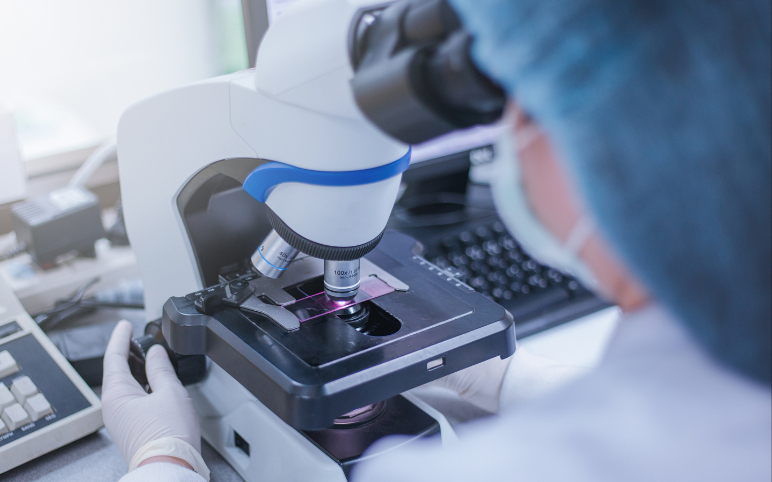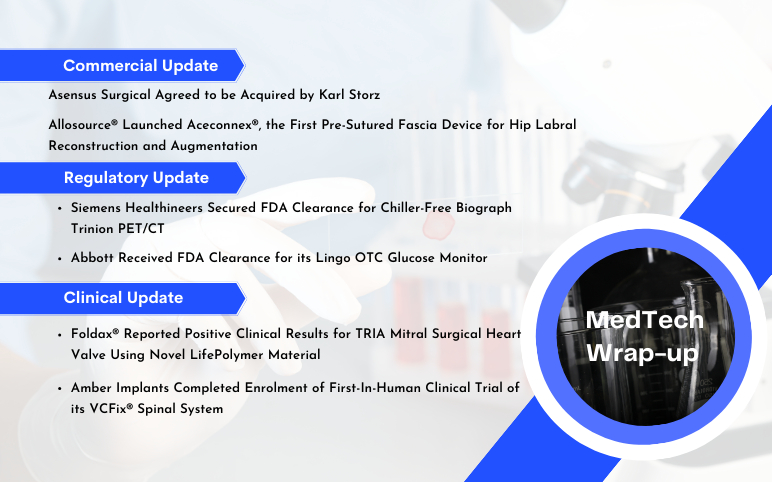Mr. Trent Northcutt, President and Chief Executive Officer of Aurora Spine, stated, “We are thrilled to receive this new approval for our DEXA SOLO-L device, the world’s first patented and FDA-cleared, color-coded ALIF standalone device. This clearance is an important step to gain new surgeon customers and new sales distribution opportunities nationwide to drive more revenue.”
Mr. Laszlo Garamszegi, Chief Technology Officer of Aurora Spine, added, “This FDA clearance is a another significant achievement for our R&D team. The DEXA SOLO-L approval demonstrates our unwavering commitment to game-changing innovation around our entire bone mimicking DEXA Technology Platform. We will continue developing proprietary products to strengthen our product offerings, and build off our patent portfolio, especially our patented DEXA Technology Platform.”
As per DelveInsight analysis, the entry of such devices in the market would help offer treatment options for spinal implants. This, in turn, would drive the demand for spinal implants. According to DelveInsight’s “Spinal Implants Market” report, the global spinal implants market was valued at USD 13.01 billion in 2021 and growing at a CAGR of 5.40% during the forecast period (2022-2027), it is expected to reach USD 17.84 billion by 2027. The rise in demand for spinal implants is predominantly attributed due to the increasing prevalence of various spinal disorders which include spinal stenosis, disc herniation, and degenerative disc diseases, among others in the older population across the globe. Moreover, shifting focus towards technological advancement in bone graft products, rising awareness among the patient population regarding spinal cord disorder, their proper management, and rising preferences for minimally invasive surgeries are the factors driving the spinal implant market.
Late-Breaking Data Reinforce Broad Range of Patients Benefit from Abbott’s Mitral and Tricuspid Heart Valve Devices
On June 08, 2022, Abbott, is a worldwide healthcare leader dedicated to assisting individuals at all stages of life to live more fully. With leading companies and products in diagnostics, medical devices, nutritional, and branded generic medications, their portfolio of life-changing technology spans the range of healthcare. The company has 113,000 co-workers which provides assistance to individuals in over 160 countries.
Abbott announced late-breaking data for MitraClip™, the world’s first transcatheter edge-to-edge repair (TEER) device, and TriClip™, a first-of-its-kind minimally invasive tricuspid heart valve repair device. The findings support the capabilities of the company’s structural cardiac solutions for mitral and tricuspid regurgitation (MR & TR), respectively, across a wide spectrum of patient groups with leaking heart valves.
One-Year Results from the MitraClip EXPAND Study
The global EXPAND study is the largest contemporary, real-world study of MitraClip NTR/XTR that used an independent echo core lab and clinical events committee. The analysis of one-year clinical and functional outcomes demonstrates the benefit of MitraClip in secondary MR patients both within the eligibility criteria for Abbott’s COAPT trial – which studied symptomatic heart failure patients with moderate-to-severe or severe secondary MR – and outside COAPT eligibility, including patients with moderate at baseline MR and patients with advanced heart failure.
The data across all patient groups through one year showed:
- Significant MR reduction to ≤1+ MR (81.3%-97.2%)
- Improvements in New York Heart Association (NYHA) class (a classification of functional limitations resulting from cardiac disease) and quality of life from baseline
- Comparable all-cause mortality and heart failure hospitalization rates
Insights from TRILUMINATE and bRIGHT TriClip Studies
Patients with TR who are candidates for transcatheter repair commonly have a pacemaker lead across the tricuspid valve. Combined outcomes from the TRILUMINATE and bRIGHT prospective, single-arm, multi-center trials examined whether TR patients previously implanted with a pacemaker lead can benefit from the TriClip device and is the first report focusing on this group. In patients with TR and a pacemaker lead across the tricuspid valve.
The following 30-day results of the TriClip and TriClip G4 TEER systems were demonstrated:
- High rate of implant (98%) and acute procedural (91%) success
- At least a two-grade TR reduction in 64% of patients
- Life-changing clinical improvements included 69% of patients achieving NYHA Functional Class I/II, an improvement by 57% from a baseline of 12%, with a marked 19-point improvement in the Kansas City Cardiomyopathy Questionnaire (KCCQ) score (a self-assessment of symptoms, physical and social limitations, and quality of life in patients with heart failure)
“This late-breaking data debunks traditional thinking that patients with pacemakers may not be eligible for or respond to tricuspid TEER therapy,” said Georg Nickenig, M.D., professor and chair, Heart Center at University Hospital Bonn, Germany. “The findings continue to demonstrate TriClip’s ability to reduce TR and improve quality of life in a broad range of anatomies.”
According to DelveInsight analysis, the entry of such heart valve devices would massively transform care for patients with cardiovascular diseases. According to DelveInsight’s “Tissue Heart Valves/Cardiovascular Prosthetic Devices Market” report, the global tissue heart valves market is expected to grow at a moderate CAGR during the forecast period (2022-2027). The demand for tissue heart valves is primarily witnessing growth on account of the high prevalence of heart valve diseases such as aortic valve degeneration and aortic stenosis, increase in demand for minimally invasive procedures, and technological advancements in the tissue heart valves and longer life expectancy of the geriatric population.
Study Supports Boston Scientific’s Acurate Neo2 Aortic Valve System
On June 08, 2022, Boston Scientific, a manufacturer of medical devices, help in transforming the lives of patients around the world through its innovative solutions in the fields of electrophysiology, gastroenterology, interventional cardiology, pain medicine, urology, vascular surgery, neurological surgery, and orthopedic surgery. It focuses on the development of medical devices which help physicians, medical staff, and healthcare providers to prevent illnesses, to correctly diagnose and determine the right treatments for people who do become ill and help them to recover faster.
The Boston Scientific (NYSE:BSX) Acurate Neo2 TAVI device has shown to have good hemodynamic performance and clinical results, according to new registry data. In an investigator-driven study, retrospective registry data from 2,026 patients across 34 European centers compared outcomes with the previous generation Acurate neo valve from the NEOPRO registry (1,263 patients in 18 centers) with outcomes for the Acurate neo2 valve from the NEOPRO2 registry (763 patients in 16 centers).
Results demonstrated a significant reduction in moderate or severe paravalvular aortic regurgitation (PAR) for the Acurate neo2 valve 2% vs. 5% with Acurate neo), meeting the primary endpoint with a higher Valve Academic Research Consortium 3 (VARC-3) intended valve performance at 96% vs 90%.
The Neo-Align study, which included 170 patients who underwent transcatheter aortic valve implantation (TAVI) with Acurate Neo2 using a novel implant technique to attempt commissural alignment of the prosthetic and native valves, reported positive results last month. The results of that study showed that commissural alignment can be done safely, effectively, and quickly. Furthermore, data from the ITAL-neo registry revealed that Acurate Neo2 outperformed the previous generation (Acurate Neo), demonstrating the valve’s improved capacity to reduce PVL with its sealing technique. With Acurate Neo2, the trial fulfilled its primary goal of a three-fold decrease in more-than-mild paravalvular aortic regurgitation (11.5 percent for the first generation valve, 3.5 percent for Acurate Neo2).
According to a spokesperson working on behalf of Boston Scientific,”the findings were driven by the superior performance of Acurate neo2 in patients with heavy aortic valve calcification. It also demonstrated a significant reduction in mild PAR for patients with Acurate neo2 and had similar 30-day results for VARC-3 technical success, device success and one-year survival after transcatheter aortic valve replacement (TAVR), reaching the secondary endpoint”.
As per DelveInsight analysis, the entry of such devices in the market would help offer better treatment options for the aortic valves. This, in turn, would drive the growth of the “Transcatheter Aortic Valve Replacement Devices/Implantation Market. The global transcatheter aortic valve devices market was valued at USD 3.23 billion in 2021 and growing at a CAGR of 15.41% during the forecast period (2022 to 2027), it is expected to reach USD 7.64 billion by 2027. The demand for transcatheter aortic valve replacement devices is primarily being boosted by the increasing prevalence of aortic regurgitation and the technological advancements pertaining to the transcatheter aortic valve replacement arena which are expected to increase in the product demand thereby contributing to the growth of the transcatheter aortic valve replacement devices market during the forecast period from 2022-2027.
Lifetec Group Acquired by Resolution Medical
On June 01, 2022, Resolution Medical, a portfolio company of Arcline Investment Management and a premier vertically integrated medical device contract development and manufacturing organization (CDMO), announced that it has acquired LifeTec Group™, based in Eindhoven, the Netherlands, LifeTec is a major worldwide pre-clinical contract research organization (CRO) focused on the investigation and demonstration of medical device innovations as well as procedural skills training utilizing biosimulation systems.
“LifeTec’s biosimulation services and technologies add clinical insight depth and accelerate R&D execution for medical device companies around the world. We have long been impressed by the LifeTec team’s capabilities, and are extremely excited to come together,” Resolution Medical CEO Luke Johnson said. “Our customers look for fully integrated development and manufacturing capabilities, fast and agile execution, and clinically deep anatomical and physiological expertise. That is what Resolution Medical offers and embodies. LifeTec is a fantastic addition to further our mission of Partnering to Bring the Frontiers of Medical Technology to Life.”
LifeTec CEO Jurgen de Hart commented, “Medical technology innovation is best achieved by integrating design, prototyping, pre-clinical verification and validation, and manufacturing. We’ve found an excellent partner in Resolution Medical to globally leverage the value we bring by combining our unparalleled pre-clinical services with their best-in-class development and manufacturing services. We’re incredibly excited to join Resolution Medical and shape the future of accelerated medical technology innovation.”
Paragon 28 Launched Monkey Rings™ Circular External Fixation System
On June 09, 2022, Paragon 28, Inc., a premier medical device company focusing on the foot and ankle orthopedic industry, launched the Monkey Rings Circular External Fixation System for trauma, deformity repair, and limb salvage. The company provides solutions, procedural approaches, and instrumentation for a wide range of foot and ankle ailments, including fracture fixation, hallux valgus (bunions), hammertoe, ankle, progressive collapsing foot deformity (PCFD) or flatfoot, Charcot foot, and orthobiologics, since its inception.
The Monkey Rings Circular External Fixation System is designed to use external wires and screws that can be fixed into the bone to retain anatomic position while offering stability, preservation of soft tissue, and allowing for adjustability and functionality. The System allows hospitals and surgeons to deal with a single vendor for internal fixation, external fixation, wound management, and biologics.
Paragon 28’s CEO, Albert DaCosta, commented. “P28 is committed to commercializing technologies to enable better outcomes for foot and ankle patients, and the launch of the Monkey Rings Circular External Fixation is another significant step in the fulfillment of our mission. Combined with the launch of the Monkey Bars Pin-to Bar External Fixation System earlier this year, we are building out a strong external fixation portfolio and complementing our comprehensive internal fixation, biologics and soft tissue options.”
According to DelveInsight analysis, the launch of such external fixation systems increases the external fixation systems market growth. According to DelveInsight’s “External Fixation Systems/External Fixation Devices Market” report, the global external fixators market was valued at USD 910.63 million in 2021 and growing at a CAGR of 5.62% during the forecast period (2022-2027), it is expected to reach USD 1,264.22 million by 2027. The external fixators market is witnessing a positive market growth owing to the factors such as rising incidents of road accidents, a growing geriatric population, increasing prevalence of degenerative bone disorders such as osteoporosis and osteoarthritis, and increasing product development activities with the latest innovations with respect to external fixators among others.
LENSAR® Receives U.S. FDA Clearance of ALLY™ Adaptive Cataract Treatment System
On June 13, 2022, LENSAR, Inc., a global medical technology company focused on advanced femtosecond laser surgical solutions for the treatment of cataracts, announced U.S. Food and Drug Administration (“FDA”) 510(k) clearance for its next-generation ALLY Adaptive Cataract Treatment System (“ALLY” or “ALLY System”). It’s the first FDA-approved platform that allows cataract surgeons to perform femtosecond laser-assisted cataract surgery (“FLACS”) in a single, sterile environment. During a controlled and targeted first rollout, the company aims to deliver the first ALLY Systems to surgeons in the third quarter of this year. In 2023, the Company expects to make ALLY broadly available to cataract surgeons following this launch.
ALLY is the first cataract surgery platform that uses Adaptive Intelligence to autonomously identify cataract density, optimize fragmentation patterns, and energy settings, with the objective of reducing overall energy given, contributing to faster visual recovery and improved patient outcomes. Surgeons have a unique chance to increase efficiency in any operating room or in-office surgical suite because of ALLY’s reduced footprint and superior ergonomics.
“We are elated to bring this proprietary technology to cataract surgeons. Our mission has been to develop a platform where surgeons can seamlessly perform the entire FLACS procedure in a single setting, improve workflow efficiencies, and most importantly, help surgeons deliver better outcomes through the advanced technologies in the ALLY System. We are seeing an overwhelmingly positive response to the ALLY system. Over 125 surgeons have experienced ALLY firsthand, during demonstrations performed at the American Society of Cataract and Refractive Surgery Annual Meeting in April, and more recently at our home office,” said Nick Curtis, Chief Executive Officer of LENSAR.
As per DelveInsight analysis, such extensive research and development activities are expected to boost the cataract surgery devices market. According to DelveInsight’s “Cataract Surgery Devices Market” report, the global cataract surgery devices market was valued at USD 7.73 billion in 2021 and growing at a CAGR of 5.50% during the forecast period from 2022 to 2027, it is expected to reach USD 10.66 billion by 2027. The demand for the cataract surgery devices is primarily being boosted by a rising geriatric base, growing prevalence of lifestyle disorders such as hypertension and diabetes, increasing prevalence of cataracts, and technical innovation in product development which are expected to drive the product demand thereby contributing in the growth of the cataract surgery devices market during the forecast period from 2022-2027.



